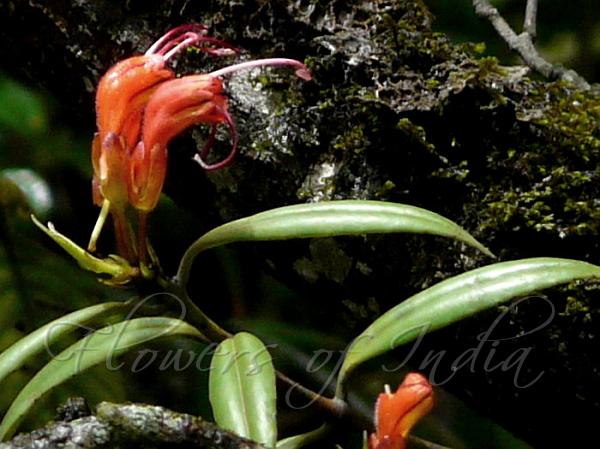|
| Parasite Blushwort |
|

|

| File size | 118498 |
| Original date | 6/2/18 12:28 PM |
| Resolution | 700 x 525 |
| Flash | Flash did not fire, auto |
| Focal length | 55.4mm |
| Exposure time | 1/400s |
| Aperture | 4.0 |
| Focus Distance | |
| Metering Mode | Spot |
| Camera make | Panasonic |
| Camera model | DMC-FZ18 |
| Sensor type | OneChipColorArea |
|
|
|
|
Photo: |
Botanical name: Aeschynanthus hookeri Family: Gesneriaceae (Gloxinia family)
Synonyms: Aeschynanthus parasiticus, Trichosporum hookeri
Synonyms: Aeschynanthus parasiticus, Trichosporum hookeri
Parasite Blushwort is a shrub with stems about 40
cm, hairless. Oppositely arranged leaves are carried on stalks 6-10 mm
long. Leaves are narrowly elliptic to oblong, 7-9 x 2.3-4 cm, thick
leathery, hairless, adaxially drying smooth or wrinkled, abaxially not
punctate, base broadly cuneate, margin entire, apex acuminate. Flowers
are borne in 4-10-flowered clusters. Bracts are persistent, green,
triangular to lanceolate, 5-9 X 1.5-3 mm. Flower-stalks are 1-1.5 cm,
hairless. Sepal cup is red or purple, 1-1.3 cm, 5-lobed from above to
near middle - tube 5-6 mm in diameter at mouth. Sepals are ovate to
broadly triangular, 3-7 X 2.2-3.2 mm. Flowers are scarlet to
orange-scarlet, 2.5-3 cm, outside softly hairy, inside hairless, mouth
slightly oblique. Limb is indistinctly 2-lipped, lips nearly equal,
about 4.5 mm. Stamens protrude out with filaments 2.6-3 cm long, and
anthers curiously coherent in pairs at tip, 2.5-3 mm. Style is shorter
than the stamens, about 1.2 cm. Capsule is about 30 cm. Parasite
Blushwort is found in Eastern Himalayas, from Nepal to NE India, Assam,
N. Burma, W. China, at altitudes of 1600-2700 m. Flowering: June-July.
| Identification credit: Tabish | Photographed at Shirui hill, Ukhrul distt, Manipur. |
• Is this flower misidentified? If yes,